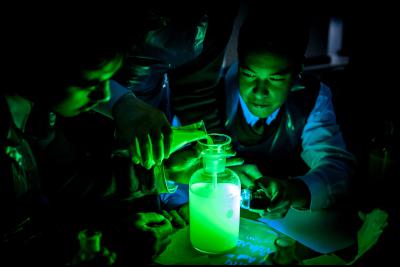
“We would like to offer other kura the same opportunity. I have spoken with other kaiako who have said there are a lot of one-off opportunities, but to be able to have a committed programme that contributes to NCEA credits would be a significant contribution to science teaching for Māori,” says Dr Filoche.
Year 10 student Christian Mauriri, from Te Kura Kaupapa Māori o Ngā Mokopuna wrote about the day in te reo Maōri and English:
I te tau nei i waimarie mātou ngā tauira tau 9-11 o Te Kura Kaupapa Māori o Ngā Mokopuna ki te haere ki te awheawhe pūtaiao o Te Whare Wānanga o Ōtākou ki reira ako ai i ngā mahi o te pūtaiao e aro ana ki te karu o te kau, te karu o te tangata, te pūrama kōrekoreko anō hoki. Ko te wahanga e pai ana ki ahau ko te tūhura ki roto i ngā karu whārahi kia kite ai i te miriona o ngā pūtau i roto i tētahi wāhanga iti o te karu o te tangata. He mīharo hoki te whakamahi i te pene muramura ki te waitohu i tētahi pepa me te whakamahi i te pūrama aho katikati ki te kite i te po.”
“This was another successful and engaging day, these guys really honed their dissection skills – text book, and we’ve saved the annotations in Māori for others to learn from. We would love to offer others this opportunity and need to find a way to make it happen and ensure it can be sustainable and ongoing for others too,” says Dr Filoche.
The much-delayed English draft curriculum is now out for consultation, generating discussion from teachers.
Research from AUT demonstrates arts, culture and recreation have positive impacts on all aspects of…
How effective has the school phone ban been in achieving its aims? Researchers from the…
School camps and excursions deliver hands on learning experiences, helping to consolidate classroom learning.
Innovations in AV technologies present new opportunities to engage with students. We look at how…
A new report from the University of Auckland’s Our Voices Project asks young people what…
This website uses cookies.